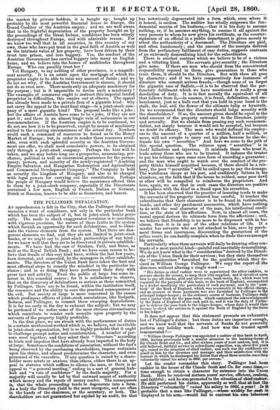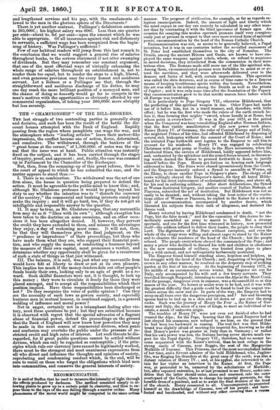THE PULLINGER DEFALCATION.
AN apprehension is felt in the City, that the Pullinger fraud may occasion a want of confidence, not only in the particular bank which has been the subject of it, but in joint-stock banks genii rally. The mode to check exaggerated revulsion is to ascertain, with vigorous precision, the nature of those faults in the system which furnish an opportunity for such defalcations, and to elimi- nate the vicious elements from the system. That there are dan- gerous elements we find, and they are not limited to joint-stock banks, or we might say to joint-stock partnerships of any kind ; for we know well that they are to be discovered in private establish- ments. We have had the case of Strahan, Paul, and Bates, as well as the Royal British Bank ; and we have some reason to be- lieve that frauds of this very kind have, within the last few years, been detected, and concealed, by the managers in other establish- ments. The directors of the Union Bank have taken the best and most effectual steps to remedy the mischief in the particular in- stance ; and in so doing they have performed their duty with great tact and activity. Even the public at large has some in- terest in this remedial course ; for it is satisfactory to observe, that on the discovery of defalcations so serious as those committed by Pullinger, there are to be found, within the institution itself, the resources and the ability to cure the practical consequences of the evil. But society at large is more concerned in the causes which predispose officers of joint-stock associations, like ltedpath, Robson, and Pullinger, to commit these sweeping depredations. It is far too early in the day to exhaust the subject; but we may be pardoned if we notice some of the most obvious circumstances which contribute to render such assaults upon property by the servants of the property highly profitable.
In the first place, we are struck with the performance of duties in a certain mechanical method which is, we believe, not inevitable in joint-stock organization, but is so highly probable that it ought to challenge prompt notice and counteraction. A number of per- sons meet together, and they select their " Directors " according to hints and impulses that have already been imparted to the body at large. Sometimes the conditions of association, without the fact's being observed by the purchasing shareholders, impose restraints '
upon his choice, and almost predetermine the Character and even personnel of the executive. If any question is raised by a share- holder more astute or anxious than others, either there is an ap- peal to statutes which suffices to silence le man, or there is an appeal to " a general meeting," ending in a sort of general hub-. limb and "a vote of confidence" by the docile majority. For a majority will usually be led by that outward aspect of authority which money and the repute of money confer. The consequence is, that the whole prooeeding tends to degenerate into a form. As a body the Directors yield to the most energetic, and are often in the hands of the chairman, or the secretary, or both. The shareholders are not guaranteed but cajoled by an audit, for that
has notoriously degenerated into a form which, even where it is honest, is. useless. The auditor has wholly outgrown the fun- damental maxim of his business,—that it is his duty to assume nothing, or, if he assumes anything, to assume it all against the very persons to whom he now gives his certificate, as the counter- signature of an official in a public department is given merely to attest the authenticity of a document. The Directors are paid, and often handsomely ; and the amount of the receipts derived from the perfunctory fulfilment of easy duties, suggests contrasts of an extremely demoralizing kind for the subordinates. There is anothei contrast which we believe to be of a vicious and a vitiating kind. The servants give security ; the Directors give none. If there are men who should from the concentrated responsibility reposed in them, give guarantees to those who trust them, it should be the Directors. But with them all goes by character ; and if we have comparatively few instances of directors who commit serious frauds,—though none of us forget the gigantic case of Sadleir,—it is to be observed that the per-
functory fulfilment which we have mentioned is really a of dereliction of duty. It is in fact morally the equivalent o all
that follows from essence, it is fraud, defalcation, and em- bezzlement, just as a bulb root that you hold in your hand is the stalk, the leaf, and the flower of the ultimate tulip or hyacinth. Do we recommend that the directors should lodge security with the shareholders ? If so, the amount given should be equal to the total amount of the property entrusted to the Directors. jointly and severally. But we abstain from passing any such recommen- dation, not simply because it would not be accepted, but because we doubt its efficacy. The man who would defraud his employ- ers to the amount of a quarter of a million, half a million, or more, will not scruple to carry out his plan iecause he also de- frauds his own " securities.' And here we come to the pith of this special question. The reliance upon " securities' is in itself fallacious and injurious. It misleads those who trust it, leads astray those who are to be trusted. It induces the truster to put his reliance upon some sure form of recording a guarantee ; and the man who ought to watch over the conduct of the pro- perty thinks himself acquitted because, if there should be a rob- bery, the poor " securities " will be called upon to pay the damage. The watchman sleeps at his post, and confidently fattens in his slumbers, on the faith that if the house be robbed, some poor devil or other will be compelled to reimburse the proprietors. And here, again, we see that in such eases the directors are positive accomplices with the thief in a fraud upon his securities.
It has been, observed that the practice of insuring tends to make the servants of the property insured less careful. It teaches the subordinates that their character is to be found in testimonials, bonds, and other dry parchment accessories, which have nothing to do with the real character of the man, his intellectual condi- tion, or the state of his affections. Now, in almost all cases, the moral appeal derives its ultimate force gem the affections ; and, we believe that friendship is no more to be dispensed with in bu- siness, than it is in any of the other relations of life. If a master has servants who are not attached to him, save by parch- ment forms and insurances, discounting the guarantees of the police court, he can hardly complain when he finds thieves amongst his servants.
Particularly when these servants will daily be drawing other con- trasts of a most painful kind—painful and inevitably demoralizing. We do not know what is the " consideration" derived by the Direct- ors of the Union Bank for their services; but they state themselves the " consideration " furnished for the qualities which they de- sired in William George Pullinger. We copy the report of the directors without. altering a single word :—
" His duties as chief cashier were to superintend the other cashiers, to procure checks for money, to keep their tills supplied, and it devolved upon him to pay all checks, gold and silver coin, bank-notes, &c., which were not required for the purposes of this bank, to the bank of England, accompanied by a docket specifying the particulars of each payment, and by the pass- book' of the Bank of England, which was necessarily in his official charge, and an account of these payments was also furnished by Pullinger to the principal ledger-keeper ; in the ordinary course of business, Pullinger daily sent a junior clerk for the pass-book, which contained the acknowledgment by the Bank of England of the cash paid iu, and it was the duty of Pullin- ger to deliver the pass-book to the ledger-keeper, whose duty it would then become to check the entries in it against the Bank of England by the items in his ledger."
It does not appear that this statement presents an exhaustive list of Pullinger's duties ; but those duties are important enough, and we know well that the . servants of Banks do not generally perform any holiday work. And how was the, trusted agent remunerated ?- " William George Pullinger was appointed a cashier of this bank in April, 1839, having previously held a similar situation in the banking-house of Sir Claude Scott and Co., and after sixteen years of most zealous, and, it is still believed, faithful service in subordinate capacities, was, about five years ago, raised to the situation of chief cashier, and such was the confidence re- posed in him by the directors and manager and their satisfaction with the manner in which he discharged his duties that about three months since they voluntarily raised his salary to 6001. per annum."
Let the reader reconsider this story. Pullinger had been cashier in the house of Sir Claude Scott and Co. for some time,— time enough to obtain a character for entrance into the Union Bank. Here he rendered sixteen years' service, efficient, zealous, and faithful ; and he was promoted to the situation of ohief cashier. He still performed his duties, apparently so well that at last the Directors ' voluntarily " raised his salary to 6001. a year ! Is it probable that a man like Pullinger,—whose avidity. for cash is displayed in his acts,—would fail to contrast his own laborious
and lengthened services and his pay, with the emoluments al- lowed to the men in the glorious sphere of the Directorate ? There is yet another contrast. Pnllinger's defalcation amounts to 263,000/. ; his highest salary was 6001. Less than one quarter per cent—about 44. 6d. per cent—upon the amount which he was able to appropriate. Of all insurances against risk and dishonesty in servants, a sufficient wage has been recognized from the begin- ning of history. Was Pullinger's sufficient ? Few of our habitual readers will jump from this last remark to the conclusion that we would suggest a general rise of salaries throughout banks, to the serious abatement if not utter swamping of dividends. But they may remember our constant argument, that one of the most effectual ways of virtually enhancing the whole range of salaries throughout an establishment is, not to render them too equal, but to render the steps to a high, liberal, and even generous provision easy for every honest and assiduous servant. Let a Robson or a Pullinger see that, through the straightforward and assiduous discharge of his duties, he may one day reach the more brilliant position of a moneyed man, and the chance of doing so honestly would go far to compete in the man's motives with the opportunities so obviously afforded by our commercial organization, of taking your 260,0001. more abruptly but less securely.



























 Previous page
Previous page